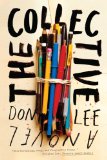Book Club Discussion Questions
In a book club? Subscribe to our Book Club Newsletter!
Please be aware that this discussion guide will contain spoilers!
- If there was a final letter from Joshua to Eric that got misdirected to NStar, what do you think Joshua would have written?
- Are minority associations in various professions useful or counterproductive? What do they offer participants? Does the solitary nature of artistic work contribute to the 3AC's concern about defining themselves as part of a tribe or race and maintaining their cultural integrity? Why is it so difficult for the 3AC to create their mission statement?
- If the forty-one-year-old Eric who narrates this story were just meeting Joshua and Jessica now, would he still consider them as interesting as he had when they were college freshmen?
- Do you think Eric and Joshua consider Jessica an equal in their three-sided friendship or in the context of the 3AC? Would she have been a "charter member" without the sexual element she added to their dynamic?
- Do you think Eric makes the right choice in terms of his own dream of becoming a writer? Who are the real cowards in the novel?
- Eric says that "people don't change. They merely hide things from you and lie." Do either Eric or Joshua change? What do they continue to hide from each other?
- We see during Eric's return to his family during Christmas break in his freshman year that he feels he has "moved beyond them." Is this typical of every college student's experience, or is it especially acute for those who might feel marginalized by race or class? Does Eric pay a price for distancing himself from those closest to him?
- The traditional role of the artist is to convey a sense of the "beautiful"—evoking the most elevated, exquisite, and universal human emotions—while, to some degree, entertaining and educating the public. The 3AC believes that for a minority artist, questions of cultural identity are an essential part of the responsibility to "educate," and possibly the primary purpose of their art. Do you agree? What kind of balance, or tension, is necessary between these different artistic obligations?
- Meredith Yee's article in the Boston Record describes the 3AC "as a bunch of pretentious twentysomething layabouts . . . whining about racial injustice while lolling, rather comfortably, in a tony Harvard Square house." What do you think is unfair, and fair, about this observation? How do accusations of elitism and racial exclusion work both with and against each other in society at large?
- Councilman Barbosa refers to his use of racially loaded language as "creative license." Eric counters that "these things are never innocent," are "never just words." Is either completely wrong or right?
- You've read Eric's depiction of Joshua's life. Is Eric reliable as a narrator? Do you entirely trust his point of view, or is he trying to cast himself in a better light? If this story had been told by Joshua, how would he have depicted Eric?
- In Eric's scathing summation, he labels Joshua "a liar, a narcissist, a naysayer, a bully, and a misogynist; a whiner, misanthrope, and cynic." Yet he felt compelled to tell the story of their relationship, to provide the memorial that Joshua explicitly forbade. Why is Eric so driven to tell Joshua's story? In what ways did Joshua serve as a catalyst in Eric's life? Do you think Joshua also affected Jessica as profoundly?
- One of Eric's final thoughts is that Joshua was the real idealist of the 3AC. Then he recalls Jessica's comment that the source of Joshua's pain was his "always trying, so desperately, to live up to [Eric's] expectations." In your mind, which of the two was more idealistic—the person setting the bar impossibly high?
Unless otherwise stated, this discussion guide is reprinted with the permission of W.W. Norton & Company.
Any page references refer to a USA edition of the book, usually the trade paperback version, and may vary in other editions.
